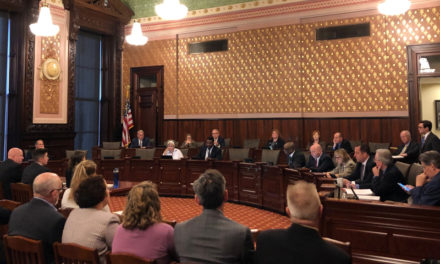
Report: Illinois ranks highly for access to fertility preservation for cancer patients

Illinois fares well when it comes to access to fertility preservation for cancer patients, according to a study released this week by researchers at Northwestern Medicine.
The report found more than 3.6 million reproductive-age female individuals lack geographic access to oncofertility services. Some states and regions lack fertility preservation insurance mandates and legislation making egg and embryo freezing more affordable.
“We’ve really seen the story come together (in Illinois) of where the legislative and the geographic access has reduced a lot of the barriers that patients might face in accessing this care,” Nivedita Potapragada, one of the study’s researchers, recently told Health News Illinois.
Potapragada spoke about the highlights of the report, what sets Illinois apart from other states and what more policymakers can do to help.
Edited excerpts below:
HNI: What were some of the major takeaways from the study?
NP: One of the biggest barriers to the way that patients access comprehensive cancer care is geography. It’s often an underlooked fact that patients need to travel to get cancer care. Fertility preservation, specifically, is one of those services where you need to be closely monitored. There’s a lot of follow-up that’s required. It’s a fairly time-intensive and resource-intensive process. And so one of the big things that we were hoping to understand by doing this study was, given that patients have to travel this way to access all of this care and resources, are we actually serving people in the geographic locations where they are trying to access the care? So I think that that was a big takeaway: just being able to understand where are the most underserved regions of the United States.
As well as geographic access, a lot of the legal protections in terms of mandating that insurance companies cover and offer fertility preservation are determined at the state level. So that was a big takeaway for us — understanding that all of these state-based fertility preservation mandates were actually often associated with the level of geographic access that was also available in those states. So we found that states with fertility preservation mandates had the highest rates of patients with geographic access … Just understanding the overlap between the legal and the geographic access to care, these are significant caveats that we had to make as part of this analysis.
HNI: How does Illinois compare to other states?
NP: In terms of the geographic access, we’re one of the most well-served states. This is wonderful, but also a testament … We have really good legislative access to fertility preservation. That is one of the recent things that Illinois has done, and so I think ensuring that a patient’s insurance is covering those procedures opens up a lot of doors, not only for patients to be able to get the care that they need, but also for ensuring that those resources are made available. Those providers are reassured by the fact that these patients are going to be covered for the care that they’re receiving. And patients also feel more reassured that they’re not paying out of pocket for sometimes really expensive and costly procedures that are really time intensive. And so I think that’s how Illinois is unique. We’ve really seen the story come together of where the legislative and the geographic access has reduced a lot of the barriers that patients might face in accessing this care.
HNI: Why is this so important for individuals to be able to have this sort of access?
NP: Typically cancer patients, either because of their cancer itself or because of treatments for their cancer, are unfortunately most likely going to experience some sort of infertility difficulties. For a lot of our patients, especially women of reproductive age, anywhere between 15 and 44, that’s a really challenging diagnosis. That’s a hard thing to hear. You are diagnosed with cancer and you’re also facing these long-term changes to your lifestyle, your family, the life that you envision.
And so I think fertility preservation in that field is really important because it’s not only an essential part of comprehensive cancer care, like understanding that family life and family planning are part of the life that we envision for ourselves long term, but also the urgency, knowing that often the treatments are the things that affect patient’s fertility. Being able to proactively address those concerns and integrate that into the overall discussion and plan that patients undergo during the cancer diagnosis can actually be really beneficial for their mental well-being, their physical well-being. And it also allows us to kind of address those challenges before issues with infertility arise.
HNI: What are some of the remaining challenges for addressing this issue?
NP: A lot of it has to do with the intersectionality of different factors that affect how a patient can access this care. So geography is one really important factor, just given the intensity of treatments and the level of care that’s needed for fertility preservation. But finance is a really big part of it. The cost of a single (intrauterine insemination) cycle or a single fertility preservation cycle can range from like $11,000 to $12,000 per cycle. And that’s a really important thing that we sometimes underestimate. A lot of these patients are facing financial difficulties in the space of their cancer diagnosis alone. And so adding an additional amount to that for fertility preservation, when it may not be the most urgent thing on their mind, is a really big consideration. And I think that’s important for providers to think about and to acknowledge, but also to have that conversation with patients.
HNI: What are some things that policymakers can be doing to help address this issue?
NP: Our study obviously includes a really good understanding of how the state insurance mandates are associated with and reflected in geographic access to care and vice versa. That relationship is bidirectional, but I do think that there really is a big role for legislative advocacy in terms of ensuring not only that patients have reproductive choice and reproductive freedom, but are also being enabled to access the care that they need.









